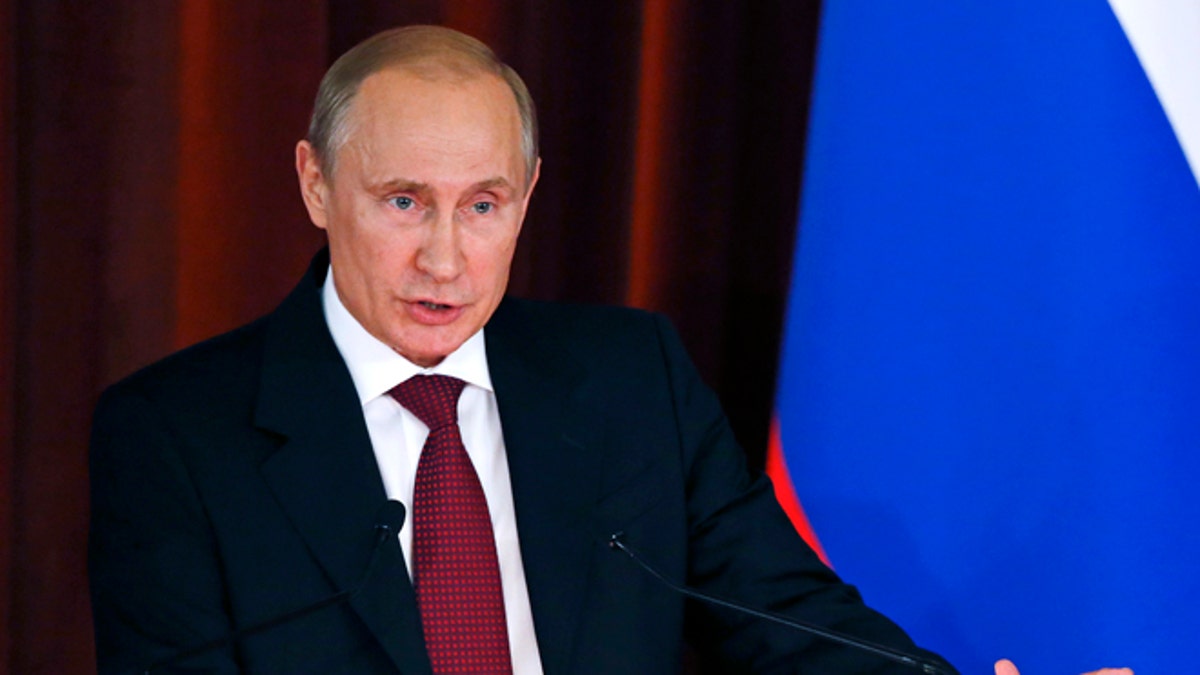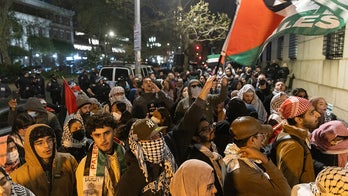
Russian President Vladimir Putin delivers a speech during a meeting with Russian ambassadors, envoys and diplomats at the Foreign Ministry headquarters in Moscow, Tuesday, July 1, 2014. (AP Photo//Maxim Zmeyev, Pool)
Russian President Vladimir Putin is heading to Latin America later this week for a three nation trip that includes stops in Cuba and Argentina before a meeting of the BRICS nations (an acronym coined by Goldman Sachs economist Jim O’Neil for the emerging superpowers of Brazil, Russia, India and China and later adding South Africa) in the northeastern Brazilian city of Fortaleza.
Officials at the Kremlin say the Russian leader is slated to meet with his Cuban counterpart Raúl Castro and his brother Fidel in Havana on Friday, before heading to Buenos Aires for energy and trade talks with Argentine President Cristina Fernández de Kirchner.
Putin will also attend the closing ceremony of the 2014 World Cup, at which Brazil will hand over hosting duties to Russia who will hold the 2018 edition of the tournament.
The BRICS’ nations have in recent years taken their role as world leaders more seriously, with one of the main talking points expected to come out of the Fortaleza meeting being the creation of a development bank to rival the U.S.-influenced World Bank.
“It’s trying to be an alternative to the U.N.,” Ben Mattern, a research associate at the Council on Hemispheric Affairs told Fox News Latino. “Russia’s main goal is to create a more multipolar system across the globe that is also in opposition to U.N. and U.S. influence.”
While trade talks and BRICS relations are the official purpose for Putin’s foray to Latin America, many analysts see the true purpose of the trip as rallying support for Moscow’s efforts in the Ukraine at a time when Western powers have leveled heavy sanctions against Russia.
Ukraine and the West have accused the government of fomenting insurgency by sending troops and weapons, including tanks and rocket launchers. Moscow has denied providing soldiers or military equipment, saying that Russians fighting in the east are private citizens. The insurgents have shot down Ukrainian aircraft, but the military has a clear superiority in firepower.
Rebel leaders in the Ukraine have pleaded with the Kremlin for military assistance, and some prominent Russian nationalists have taunted President Vladimir Putin for failing to send troops to the Russian-speaking area.
Putin has so far resisted, wary of having more Western governments slap visa bans and asset freezes on Russian officials and members of Putin's inner circle after Russia annexed the Ukraine's Black Sea region of Crimea in March.
Russia’s moves have made the country broadly unpopular across the globe, especially in the United States and Western Europe, with more than six in ten people in Poland, Germany, Italy, Spain, France, the U.S. and the United Kingdom having an unfavorable image of Russia, according to figures compiled by the Pew Research Global Attitudes Project.
Isolated from the U.S. and many European powers continues, Putin is on the hunt for new spheres of influence to bolster Russian support on the international stage.
One of the countries on Putin’s list is Argentina, which has for decades had its own territorial dispute with a foreign power in regards to the Falkland Islands – or the Islas Malvinas to Argentineans.
Argentina’s Fernández de Kirchner won points with Putin for her comments during a press conference in France over what she called the world powers’ “double standard” in the settlement of international disputes.
“If the Crimea referendum is non-valid, which took place just a few kilometers away from Russia, much less validity can be attributed to an overseas colony, 13,000 kilometers away,” she said in reference to the Falklands, according to MercoPress.
The support for Russia’s move into the Crimea earned the politically struggling Fernández de Kirchner a phone call of thanks from the normally stoic Putin and now a trip to her nation for talks.
“Russia is looking to the Argentineans to be supporters of the Russian cause in the Crimea,” Peter Hakim, a senior fellow at the Inter-American Dialogue, a Washington-based think tank, told FNL. “Putin knows he will get a very good reception there.”
Putin’s first stop in Cuba is what Hakim calls “more historical than anything,” given the two nations long ties dating back to the days of the Soviet Union, but is also a continuing sign of the Kremlin’s support of its old ally after Russia ratified earlier this week an agreement that will write off 90 percent of Cuba's $35.2 billion debt to the Soviet Union.
"Fidel is the last of the Mohicans with whom Putin can discuss the global order of the present and the future," Vladimir Orlov, head of the PIR center, a Moscow think-tank, told Agence France-Presse.
What is probably most telling about Putin’s motives on the trips are the nations that he decided to pass over. Ideological allies – and existing supporters of Russia’s claim in the Crimea – like Venezuela and Nicaragua did not warrant a visit from the Russian leader on his Latin American visit.
Analysts claim that this is a less a snub to the governments of Venezuela’s Nicolás Maduro and Nicaragua’s Daniel Ortega than it is Putin making a politically savvy move by searching out newer supporters apart from his socialist friends. Another reason for Putin skipping over Venezuela would be that, besides a lack of any real trade between the two oil producing nations, Venezuela has lost some of its sway on the world stage since Maduro took office following the death of leader Hugo Chávez and the country becoming embroiled in widespread unrest.
“Maybe if Chávez was alive then he would have gone,” Hakim said.
Putin arrives in Havana on Friday before jetting off Saturday to Argentina. He will attend the final game of the World Cup Sunday as part of a four-day visit to Brazil.
The Associated Press contributed to this report.




